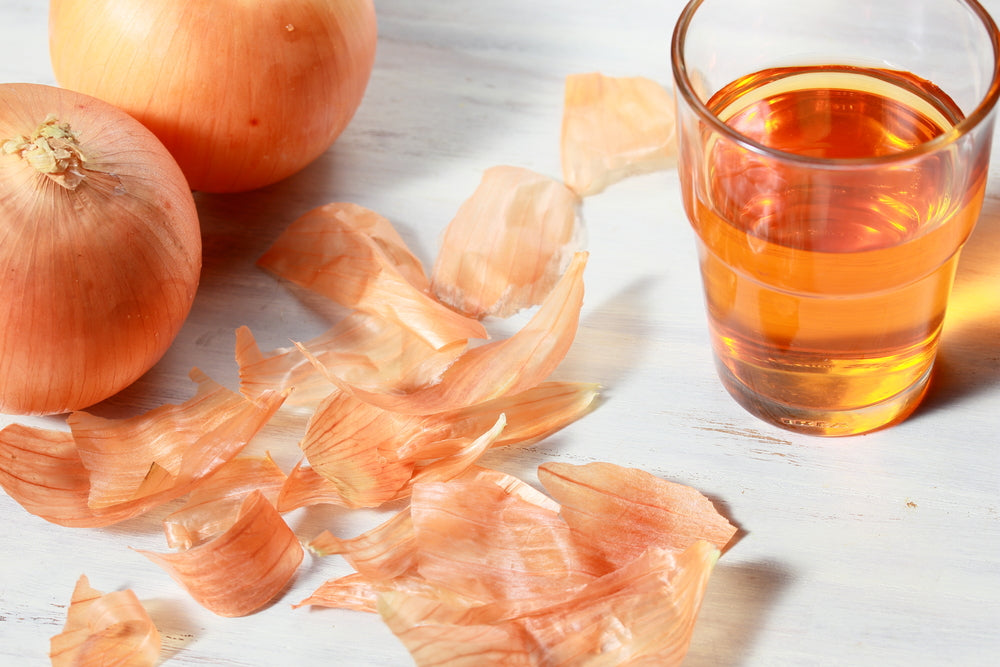
By Dr. Chad Walding, DPT, NativePath Co-Founder
Senior Wellness Expert
Quercetin is a potent antioxidant compound, coming from the flavonoid family of phytonutrients.
This compound can be found in a range of plants, including onions, grapes, berries, broccoli, and citrus fruits.
 As a crucial component of immunity, antioxidants work in your body to fight off oxidative stress and protect your cells and tissues from damage.
As a crucial component of immunity, antioxidants work in your body to fight off oxidative stress and protect your cells and tissues from damage.
While oxidation is a natural part of life, if your antioxidant defenses aren't strong enough, the scale can tip to the side of oxidation.
High levels of oxidative stress alter the function of your cells and lead to degenerative and chronic diseases.
Flavonoids like quercetin, on the other hand, have antiallergenic, antiviral, anti-inflammatory, and vasodilating effects that support and protect your body from damage and illness.
Quercetin is specifically known to be one of the most widely used antioxidants for metabolic and inflammatory disorders[1].
Quercetin and Immunity
As a potent antioxidant, quercetin is a strong ally to your immune system. This is especially true for immune challenges like allergies and inflammatory diseases.
Research shows that quercetin has an inhibitory effect on immune cells called mast cells.
Mast cells release chemical messengers that can instigate an allergic or inflammatory response and can play a central role in autoimmunity.
 When researchers studied the effect that quercetin had on mast cells they found that this antioxidant compound was able to inhibit the release of chemicals such as histamine, IL-8, and TNF. These three chemical messengers are all associated with an increase in oxidative stress and inflammation. Therefore, the addition of quercetin served to calm the potential damage of mast cell activation[2].
When researchers studied the effect that quercetin had on mast cells they found that this antioxidant compound was able to inhibit the release of chemicals such as histamine, IL-8, and TNF. These three chemical messengers are all associated with an increase in oxidative stress and inflammation. Therefore, the addition of quercetin served to calm the potential damage of mast cell activation[2].
Quercetin has also been shown to have a protective effect on the cells of your gut mucosa. Your gut mucosa is responsible for protecting your gut lining from infection and secreting mucus.
This protective role is labeled as cytoprotection and is defined by a compound's ability to prevent the breakdown of your mucus membrane while allowing for the natural flow of gastric acid[3].
There are a number of harmful pathogens that can find their way into your gut and cause damage to the mucosal barrier.
In fact, it's through this mucosal barrier that many pathogens find their way into your internal circulation. Therefore, keeping the integrity of this barrier strong is crucial to overall immunity[4].
Research shows that quercetin, as a cytoprotective agent, can prevent permeability in your gut lining and block the initiation of oxidative stress that typically leads to the breakdown of your gut mucosa[5].
Since your gut is one of the primary seats of immunity (housing around 70% of your immune cells), keeping these tissues strong is an essential component to a healthy immune system[6].
Where To Find Quercetin
As mentioned above, quercetin is a naturally occurring compound that can be found in a variety of fruits and vegetables.
Some common foods that are rich in this antioxidant compound include grapes, berries, cherries, broccoli, onion, citrus, apples, tomatoes, and black tea.
 However, if you want a potent dose of quercetin, you may want to consider supplementation. Taking a high-quality quercetin supplement will guarantee potency, whereas food sources may not be quite as reliable if you’re looking for a significant dose.
However, if you want a potent dose of quercetin, you may want to consider supplementation. Taking a high-quality quercetin supplement will guarantee potency, whereas food sources may not be quite as reliable if you’re looking for a significant dose.
Another thing to keep in mind is that on its own, quercetin is not highly bioavailable.
In other words, you could take a large dose of a quercetin supplement, but most of it won’t be absorbed unless it has specific nutrients that are taken along with it.
That’s why I always suggest taking quercetin with vitamin C, which has been shown to improve the absorption[9].
At Native Path, we formulated an immune-boosting supplement that contains a high-quality form of quercetin, along with plenty of vitamin C to ensure its absorption called Native Defense.
 Native Defense includes nutrients and herbs that stimulate both your innate and adaptive immune system. This ensures that your body catches incoming intruders, but also supports long-term defenses against chronic insults.
Native Defense includes nutrients and herbs that stimulate both your innate and adaptive immune system. This ensures that your body catches incoming intruders, but also supports long-term defenses against chronic insults.
Along with quercetin and vitamin C, Native Defense also includes vitamin D, elderberry, zinc, and Siberian ginseng.
See Today's Deal On Native Defense!
References:
- https://www.ncbi.nlm.nih.gov/pmc/articles/PMC5214562/
- https://www.ncbi.nlm.nih.gov/pmc/articles/PMC3314669/
- https://link.springer.com/article/10.1007/BF03259169
- https://www.immunology.org/public-information/bitesized-immunology/organs-and-tissues/immunity-in-the-gut
- https://www.sciencedirect.com/science/article/abs/pii/S1226086X18313807
- https://www.ncbi.nlm.nih.gov/pmc/articles/PMC2515351/
- https://pubmed.ncbi.nlm.nih.gov/24223637/
- https://pubmed.ncbi.nlm.nih.gov/28677813/
- https://www.ncbi.nlm.nih.gov/pmc/articles/PMC4808895/
